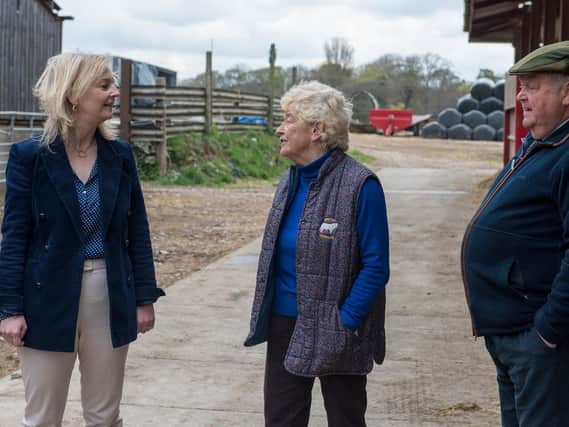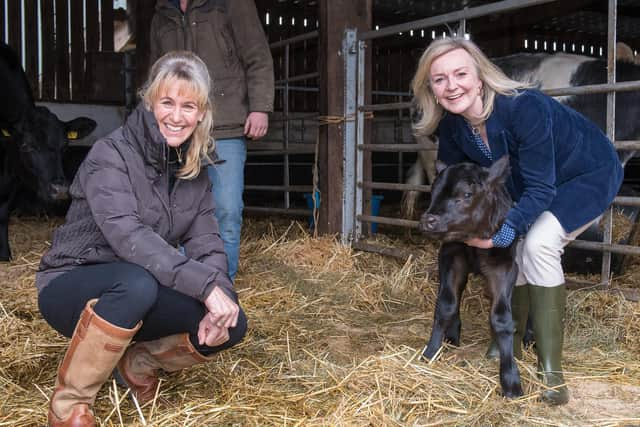Global ambitions for British beef outlined by International Trade Secretary Liz Truss as she visits a North Yorkshire farm


Michael and Margaret Atkinson hosted Ms Truss along with fellow beef farmer and NFU President Minette Batters at Mowbray Park Farm as part of Great British Beef Week.
They were joined by local producer ABP Food Group to discuss how industry and government can help boost British beef and agri products around the world.
Advertisement
Hide AdAdvertisement
Hide AdMs Truss, who is originally from Yorkshire said it was “brilliant” to be back in the county now Covid restrictions have eased and to see the 250-strong grass-fed beef herd run by the Atkinsons.


The Secretary of State who has been negotiating trade deals for British producers following Brexit said there were “huge opportunities” for beef farmers in new markets such as the US and Japan.
“Last year we saw the 24-year ban on British beef into the US lifted,” Ms Truss said.
“We know there is a 15 per cent increase every year on their demand for grass-fed beef and this, of course, is what Yorkshire farmers produce so well.
Advertisement
Hide AdAdvertisement
Hide Ad“There is also a huge demand in Asia Pacific. By 2030, 66 per cent of the world’s middle classes will be living in the Asia Pacific area and the type of product they are going to want is really high-quality British beef.”
Ms Truss said the UK’s climate and high animal welfare standards were what made British beef a premium product.
“Our climate, allows us to have this fantastic grass-fed beef and our cows are very well looked after which leads to much better quality of beef, which I have been talking to Michael Atkinson about and it just tastes fantastic.”
Ms Truss said other countries were already active in these growing markets and it was important British farmers were able to gain a foothold.
Advertisement
Hide AdAdvertisement
Hide Ad“There is rising demand for grass-fed beef and countries like Australia are already working in that market.
“We have not been so active and what we are doing now is getting our producers certified to be able to export to those markets.”
Ms Truss said she was also looking at more opportunities for British farmers to export to the Gulf and the provenance of British produce was what would make these opportunities a success.
“Because we have high standards in animal welfare and the environment we are going to be successful in these markets.
Advertisement
Hide AdAdvertisement
Hide Ad“Consumers are going to be looking more and more at provenance. They want to know how their beef is produced and where it is from. We have a very, very good story to tell, just look at this fantastic farm and its heritage. We have three generations of farmers here and that is exactly what overseas buyers want to know. They want to know that they can trust our produce.”
Ms Truss said exporting would also be beneficial to farmers as it opened up new markets for parts of the product which were not as widely eaten in the UK.
“There is a huge benefit to farmers in being able to sell overseas and with markets willing to pay a high price for our products, that means jobs here in the UK and family farms still able to continue thriving and being successful. Ultimately, that is why we are doing this.” But Ms Truss said as well as encouraging farmers to export, the strength of the home market for British produce was also important.
“The home market is strong and that will always be important. British supermarkets are increasingly sourcing British produce, because, again, they know that is what consumers are looking for.
Advertisement
Hide AdAdvertisement
Hide Ad“We have an independent trade policy for the first time in 50 years and people are more interested in trade than they were a few years ago, which I think is really positive.”
Ms Batters, a founder member of Ladies in Beef which organises Great British Beef Week, said routes to market whether out of home or export were what mattered more than anything else.
“It’s important that we grow our exports around the world and find new markets.
“We have developed a fantastic reputation for quality and we believe this also presents an opportunity to develop our market share in existing countries.
Advertisement
Hide AdAdvertisement
Hide Ad“High-quality beef produced on farms across the country is already amongst the most sustainable in the world and opening new export markets helps Britain continue to play a leading global role in sustainable agriculture. This work with the Department for International Trade is crucial to grow the British brand.”
The Department for International Trade’s (DIT) has a new Open Doors campaign to support producers wanting to export. Details are on the website.